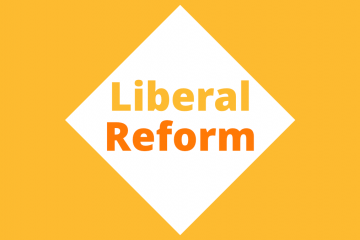It is important for Liberal Democrats to remember that Austerity is not just made up of public spending cuts, but also tax rises. That’s why Liberal Reform are disappointed to hear that the Liberal Democrats will be supporting Rishi Sunak’s move to raise corporation tax.
It is deeply concerning to see how quickly the Conservatives have moved to raise taxes. Even if it does not appear in the upcoming budget this week, it does seem inevitable that the Tories will try to hike up corporation tax. Interestingly, the Tories cite other countries, such as the USA, in providing evidence for why this is an appropriate measure, but what might be an appropriate course of action for Mr Biden isn’t necessarily the right choice for us. As the UK economy suffers from the double damage of COVID-19 and a harmful Brexit, with 69% of the economy being badly affected by either COVID-19 or Brexit according to Institute for Government research[1], our next budget must create a much more competitive offering for investment if we are going to offer struggling businesses a fair chance of surviving this economic shock.
The Tories will argue that it is vital that we raise taxes now to pay off debts incurred by COVID-19, however this argument is economically illiterate. According to Andy Verity of the BBC, of the 485.5 billion pounds borrowed in the last financial year, 450 billion will be owed to the Bank of England[2]: it is an argument without basis, and we should be firmly refuting it. Labour will be putting themselves forward as a false friend for business in this budget debate, they will argue against an immediate rise in corporation tax until the immediate economic shock is over. Although the short-term Keynesian argument is legitimate, they ignore the longer-term damage to competitiveness that an increase in corporation tax would risk if it were merely delayed.
If anything, instead of supporting the Chancellor’s corporation tax rise, we should be arguing for a further, short term cut to corporation tax to send a message to the world that Britain is open for business. We should be encouraging private investment and at the same time implementing much more ambitious programmes of public investment, as already proposed by Ed Davey’s Green Recovery Plan.
Some have remarked that corporation tax is merely a tax on profits: surely those businesses that are making a profit should be taxed more to support the economy? This seems like a sound argument on the surface but the practical implications are by no means positive. The tax rises that many Tories are calling for will not be used to build a stronger welfare state, to invest in the economy, or to support public services. No, they will be used to pay off our increased interest liabilities and pay down our increased debt, at a time where interest rates are at a record low with no signs of this relenting.
Furthermore, it is worth noting that the firms that have remained profitable during COVID-19 will likely be operating at much tighter margins, given the widespread economic impacts, and a further rise to their tax bill will mean less investment in their workforce, less investment in new infrastructure and less investment in expansion. Let’s be perfectly clear, a tax rise at this time will mean further reduced investment and economic output at a time where KPMG are estimating that GDP growth will already be down by 7.2% due to Brexit and COVID-19[3].
Ultimately, this entire discourse is serving as a distraction. This budget must be about how we are going to support small and medium-sized enterprises to survive the immediate economic shocks, and how we are going to deliver both an epidemiological and economic roadmap out of lockdown for both people and businesses. That’s why we welcome Christine Jardine’s proposals for a “furlough for SMEs” that will put SMEs first, whilst the Tories continue to fail SMEs up and down the country. Yet we must ensure that our message does not become contradictory. It is important to remember many SMEs are liable to pay corporation tax, and that corporation tax will disproportionately affect these businesses versus bigger multinationals who have the capacity to pay more tax. Raising corporation tax will not be a policy which raises tax on large businesses to redistribute it to small businesses, it will instead be a tax rise that disproportionately hits the balance sheets of the very SMEs we are seeking to support.
Furthermore, now is not the time for a rumoured tax raid on the self-employed. This would be an insult to the 3 million people that have been excluded from financial support during the COVID Crisis although we welcome the support that will be included in this budget for the newly self-employed after the great work of the APPG on Gaps in Support. A corporation tax rise will also hit directors of limited companies, many of whom will be the directors of companies eligible for corporation tax, who have been excluded from financial support. Rishi Sunak should listen to calls from Liberal Democrat MPs, led by the chair of the APPG on Gaps in Support, Jamie Stone, and implement the support packages suggested by the APPG for these workers who have already lost so much due to the pandemic instead of raising their taxes.
As we come out of the immediate public health crisis and look to the longer term economic recovery from COVID19, the Liberal Democrats must craft a distinctive position. We must be on the side of workers and businesses, we must think big, with our calls for a furlough for SMEs and plans for a green recovery. But we must also avoid taking the path of fake friendship that the Labour Party seems set to take, and stand clear and say that corporation tax must not be raised, in order to protect Britain’s competitiveness. We must also look forward to the challenges of increasing consumption to fuel our economic recovery, and consider increasing the threshold for National Insurance Contributions to put more money back into the pockets of workers of all incomes and stimulate the economy.
The Party has a real opportunity with this budget: let’s set out our case to SME owners, the self employed, and workers across the country. Let’s think boldly with a positive, liberal alternative to the budget, focused on supporting small businesses rather than returning to the austerity measures of the past.
Sources:
2:https://twitter.com/andyverity/status/1366398494114799619?s=21


